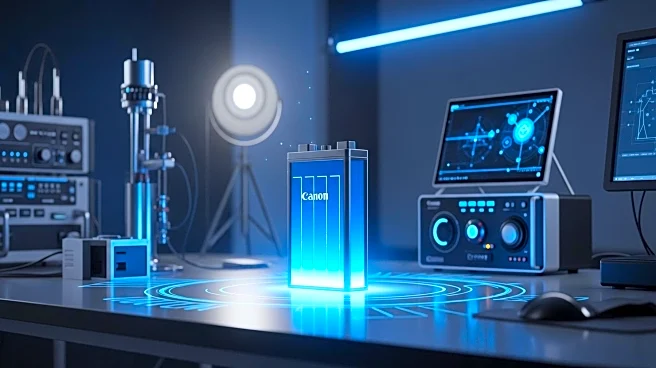What's Happening?
Chinese researchers have made a significant breakthrough in battery technology by developing a self-adaptive interphase for solid-state lithium batteries. This innovation addresses the persistent issue of tiny pores and cracks forming between the lithium metal anode and the solid electrolyte, which can weaken performance and pose safety risks. The research team introduced iodide ions into the electrolyte, which migrate to the interface during operation, forming an iodine-rich layer that attracts lithium ions and fills micro-gaps. This self-healing contact surface could lead to batteries with energy densities exceeding 500 Wh/kg, potentially doubling the lifespan of electronic devices. The development is seen as a decisive step towards the practical application of solid-state batteries, offering safer, lighter, and more efficient power sources for electric vehicles, robots, and electric aircraft.
Why It's Important?
The advancement in solid-state lithium battery technology is crucial for the future of energy storage and consumption. By enhancing the safety and efficiency of batteries, this development could significantly impact industries reliant on portable power sources, such as electric vehicles and consumer electronics. The potential increase in energy density and lifespan of batteries could lead to longer-lasting devices and vehicles, reducing the need for frequent replacements and contributing to sustainability efforts. Furthermore, the innovation aligns with global trends towards cleaner energy solutions, supporting the transition away from fossil fuels and towards renewable energy sources.
What's Next?
The next steps involve further testing and refinement of the technology to ensure its reliability and scalability for commercial use. Researchers and industry stakeholders will likely focus on integrating this technology into existing manufacturing processes and exploring partnerships to accelerate its adoption. As the technology matures, it could attract interest from major automotive and electronics companies looking to enhance their product offerings with more efficient and sustainable power solutions.
Beyond the Headlines
This development may also influence regulatory and policy frameworks surrounding battery safety and environmental impact. As solid-state batteries become more prevalent, there could be increased scrutiny on the sourcing and disposal of materials used in their production. Additionally, the technology could spur innovation in related fields, such as renewable energy storage and smart grid systems, further advancing the global shift towards sustainable energy practices.











